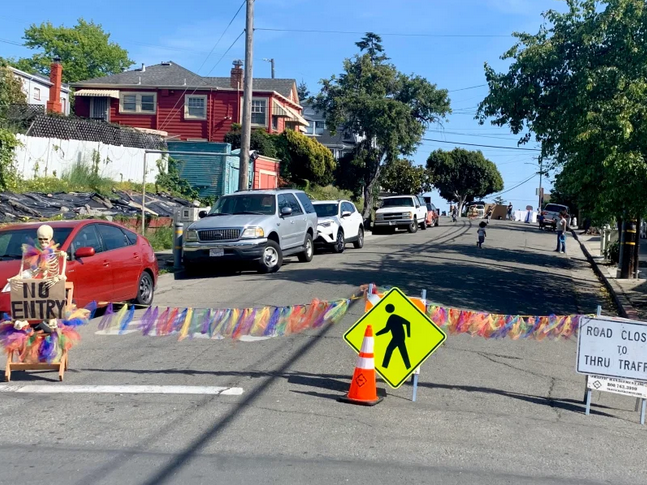The city that pioneered Slow Streets at the start of the pandemic is now cancelling the program. Bike East Bay’s Dave Campbell talks about future plans for advocacy to preserve some of the program and bring back a more robust version in the future.
Oakland DOT has decided to join Berkeley and end its slow streets program, rather than follow Alameda and San Francisco, which made it permanent. The A-frame semi-diverters are coming down all across Oakland as we speak, and twenty-plus miles of neighborhood streets will revert to how they were before the pandemic. But does this mean Oakland is ceding its national leadership on slow streets?
It’s an issue of equity and priorities, among others. OakDOT wants to be an equitable city department, serving all neighborhoods, and in particular improving safety and mobility in underserved areas of the city, particularly West Oakland, Chinatown, Fruitvale, and deep East Oakland. Many existing slow streets in these neighborhoods have not worked as planned, as detailed in this OakDOT September 2020 slow streets evaluation (PDF). Strong neighbor opposition to slow streets in some areas is a known issue, due in part to a lack of notice to neighbors and the reality that as the pandemic continues people have higher priorities than strolling down the middle of their street. At the same time, it is a lot of work for OakDOT staff to maintain the A-frames and continue to respond to neighborhood concerns about slow streets.
For neighbors who like their slow streets, OakDOT plans to implement permanent slow streets through the City’s Capital Improvement Program, the Five Year Paving Plan, and the planning-to-date for Neighborhood Bike Routes, but this will take time, even years. In the meantime, residents may continue to submit comments on the Slow Streets Essential Places Program to the City of Oakland 311. Bike East Bay’s efforts are pivoting to neighborhood collaboration, partnering with Walk Oakland Bike Oakland and the East Oakland Collective, to focus on slow street neighborhoods that have not accepted the program.
We have received a generous grant to focus on District 6 neighborhoods (Coliseum Area) and Chinatown. The goal of these efforts, and what is different this time, is a focus on first meeting with neighbors, understanding their concerns and ideas, working with more than just one city department to be responsive, and helping build more trust and neighborhood collaboration on shared goals of safety and mobility. In this way, slow streets can be neighbor streets, and can work more equitably throughout Oakland. With traffic violence getting worse, this work has never been more important. You can help by volunteering later this year to help us throw some recurring block parties. More on this soon.
More on Oakland Slow Streets – Essential Places
A recent article on Oakland’s and New York’s slow streets/open streets programs, both ending.






